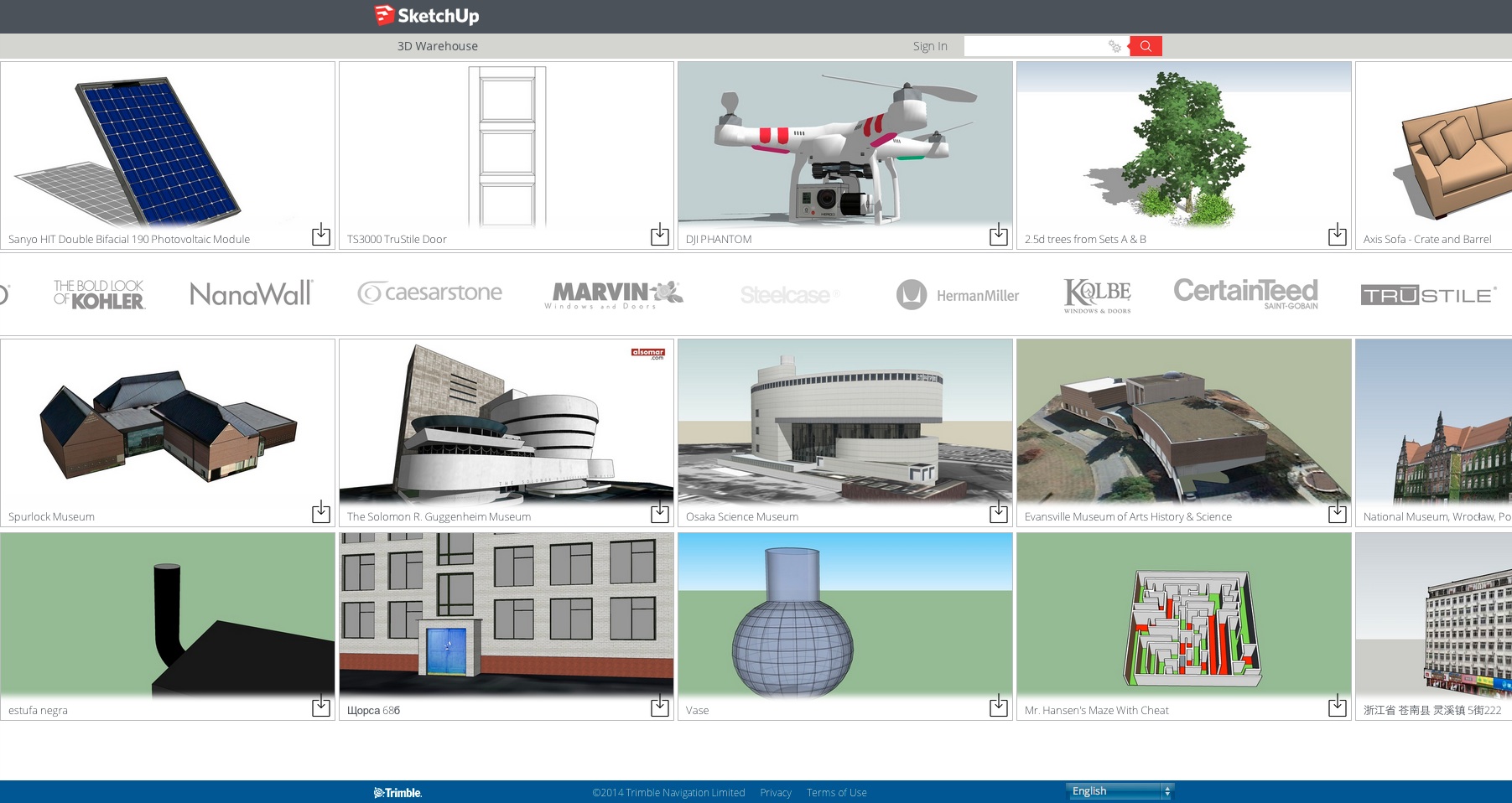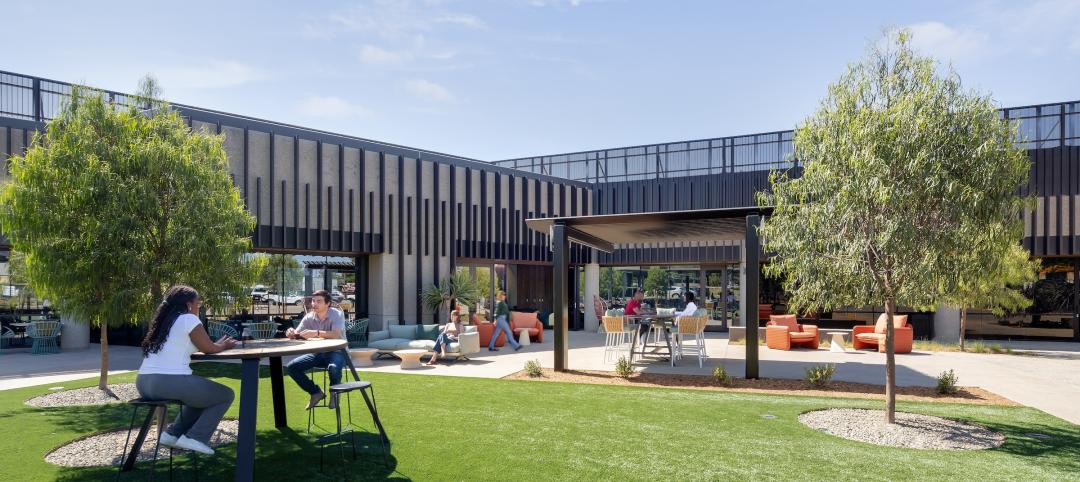Trimble has released SketchUp 2014, the latest version of its popular 3-D modeling platform for architects, engineers, design and construction professionals, as well as members of the global maker community.
SketchUp 2014 features major enhancements to SketchUp’s 3-D Warehouse—the world’s largest repository of free, high-quality, 3-D content—as well as new tools that improve the classification of design objects, tighten interoperability with other products used in Building Information Modeling (BIM) workflows, and make professional documentation more efficient.
“As SketchUp’s professional footprint expands, access to content and broad interoperability are vital issues to our customers," said Chris Keating, director of the Architecture Division within the Trimble Buildings Group. "With SketchUp 2014, we’re giving users better tools to easily access the models they need and to ensure those models add value throughout the information modeling process.”
New 3-D Warehouse: Where Content is King
SketchUp’s 3-D Warehouse is an online repository for finding, storing and sharing useful 3-D models. In SketchUp 2014, the 3-D Warehouse has been rebuilt, making it easier for users to quickly find the models they need, create and organize their own collections, and share them with the world.
- The new 3-D Warehouse now features an integrated WebGL viewer, enabling users to preview and orbit models in full 3-D before downloading them into their own projects.
- Users can now upload 3-D models directly from their Web browsers, without first opening them in SketchUp, while the maximum size of uploadable models has been increased from 10 to 50 megabytes.
- The new Product Catalogs feature speeds the task of finding specific manufacturers’ products—from windows to washing machines—letting users start their models with the exact items they intend to use.
Building upon SketchUp Pro’s Information Modeling Foundation
Since BIM is an increasingly important process for professionals in architecture, engineering and construction, Trimble has expanded SketchUp Pro’s interoperability with other commonly used tools and data. The new release provides an easier way for users to participate in the information modeling process by ensuring that their objects and models—and the data connected to them—remain consistently identifiable throughout the BIM workflow.
SketchUp Pro 2014 contains three new features that are specific to information modeling:
- IFC Export: since the information embedded in information models is often used by other software programs, SketchUp Pro 2014 now includes another important industry standard to its roster of supported exports—the IFC 2x3 file type.
- Classifier: this feature allows users to classify objects with the pre-loaded IFC classification, use alternate classification types, or create a customized system for their specific needs.
- Component Options: provides editable options relevant to an object’s classified type, allowing pertinent data about each object to be managed throughout the information modeling process.
“BIM workflows are often complex and rigid processes, and we believe they don’t need to be,” said John Bacus, director of SketchUp product management at Trimble. “With this new release, we are enabling users to participate more effectively at any point in the information modeling process. We’ve added simple tools for adding structured information to a model in a way that is helpful to SketchUp customers, allowing them to easily pass information to others on their project teams, regardless of the tools being used.”
Documentation Done Right
Professional users will also benefit from continued enhancements to the 2-D documentation capabilities in SketchUp Pro 2014, such as: auto tags to improve accuracy and reduce repetitive work, smart labels with pre-populated relevant text, and significant improvements in speed for vector-rendered model views.
SketchUp 2014 is available now. Additional information and downloads are available at: www.sketchup.com.
Related Stories
Urban Planning | Oct 30, 2024
Bridging the gap: How early architect involvement can revolutionize a city’s capital improvement plans
Capital Improvement Plans (CIPs) typically span three to five years and outline future city projects and their costs. While they set the stage, the design and construction of these projects often extend beyond the CIP window, leading to a disconnect between the initial budget and evolving project scope. This can result in financial shortfalls, forcing cities to cut back on critical project features.
MFPRO+ New Projects | Oct 30, 2024
Luxury waterfront tower in Brooklyn features East River and Manhattan skyline views
Leasing recently began for The Dupont, a 41-story luxury rental property along the Brooklyn, N.Y., waterfront. Located within the 22-acre Greenpoint Landing, where it overlooks the newly constructed Newtown Barge Park, the high-rise features East River and Manhattan skyline views along with 20,000 sf of indoor and outdoor communal space.
Libraries | Oct 30, 2024
Reasons to reinvent the Midcentury academic library
DLR Group's Interior Design Leader Gretchen Holy, Assoc. IIDA, shares the idea that a designer's responsibility to embrace a library’s history, respect its past, and create an environment that will serve student populations for the next 100 years.
Resiliency | Oct 29, 2024
Climate change degrades buildings slowly but steadily
While natural disasters such as hurricanes and wildfires can destroy buildings in minutes, other factors exacerbated by climate change degrade buildings more slowly but still cause costly damage.
Office Buildings | Oct 29, 2024
Editorial call for Office Building project case studies
BD+C editors are looking to feature a roundup of office building projects for 2024, including office-to-residential conversions. Deadline for submission: December 6, 2024.
Healthcare Facilities | Oct 28, 2024
New surgical tower is largest addition to UNC Health campus in Chapel Hill
Construction on UNC Health’s North Carolina Surgical Hospital, the largest addition to the Chapel Hill campus since it was built in 1952, was recently completed. The seven-story, 375,000-sf structure houses 26 operating rooms, four of which are hybrid size to accommodate additional equipment and technology for newly developed procedures.
Multifamily Housing | Oct 28, 2024
A case for mid-rise: How multifamily housing can reshape our cities
Often referred to as “five-over-ones,” the mid-rise apartment type is typically comprised of five stories of apartments on top of a concrete “podium” of ground-floor retail. The main criticism of the “five-over-one” is that they are often too predictable.
Sports and Recreational Facilities | Oct 24, 2024
Stadium renovation plans unveiled for Boston’s National Women’s Soccer League
A city-owned 75-year-old stadium in Boston’s historic Franklin Park will be renovated for a new National Women’s Soccer League team. The park, designed by Fredrick Law Olmsted in the 1880s, is the home of White Stadium, which was built in 1949 and has since fallen into disrepair.
Laboratories | Oct 23, 2024
From sterile to stimulating: The rise of community-centric life sciences campuses
To distinguish their life sciences campuses, developers are partnering with architectural and design firms to reimagine life sciences facilities as vibrant, welcoming destinations. By emphasizing four key elements—wellness, collaboration, biophilic design, and community integration—they are setting their properties apart.
Adaptive Reuse | Oct 22, 2024
Adaptive reuse project transforms 1840s-era mill building into rental housing
A recently opened multifamily property in Lawrence, Mass., is an adaptive reuse of an 1840s-era mill building. Stone Mill Lofts is one of the first all-electric mixed-income multifamily properties in Massachusetts. The all-electric building meets ambitious modern energy codes and stringent National Park Service historic preservation guidelines.

















